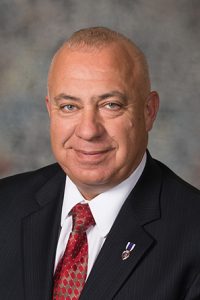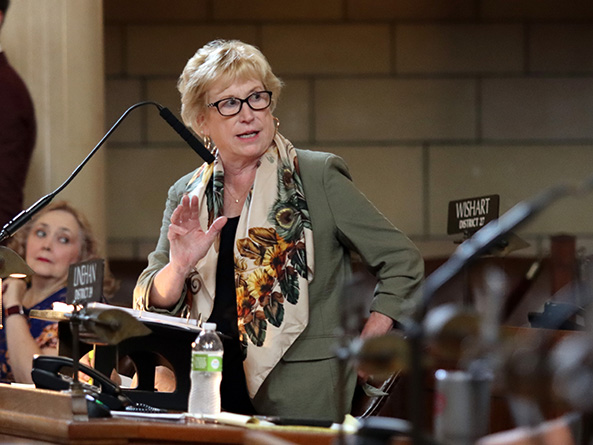Property tax measure narrowed, advanced to second round
The Legislature gave first-round approval Aug. 13 to a pared-back property tax reduction measure that would limit city and county tax asking and replace a current property tax relief program with a more direct version.

LB34, as introduced by Sen. Tom Brewer of Gordon, would have held property values at their 2024 level for four years. A Revenue Committee amendment would have replaced the bill with a modified version of Gov. Jim Pillen’s property tax reform proposal in LB1, sponsored by Elkhorn Sen. Lou Ann Linehan.
The committee amendment would have directed more state aid to school districts by incrementally reducing the maximum school general fund levy from the current $1.05 per $100 of taxable valuation to 30 cents beginning with fiscal year 2027-28.
To pay for the additional aid, the amendment would have repurposed all or part of existing property tax relief programs and imposed Nebraska’s 5.5% sales and use tax rate on dozens of currently untaxed goods and services, including soft drinks and candy, lawn care services and dry cleaning.
It also would have increased or imposed taxes on items including cigarettes, spirits, consumable hemp and alternative nicotine products.
Among other provisions, the amendment would have exempted the sale and purchase of electricity for residential use from state sales and use taxes and increased Nebraska’s refundable credit based on the federal Earned Income Tax Credit from 10% to 20%.
Additionally, it would have created a credit to offset property taxes levied by natural resources districts and required the state to reimburse counties a portion of the cost to operate and maintain county jails.
Sen. Dave Murman of Glenvil supported the committee amendment, saying it would help rebalance the state’s tax system, which currently collects more in property taxes than sales or income taxes. He said high property taxes drive residents out of Nebraska and make homes and farmland unaffordable for young people.
Lincoln Sen. Danielle Conrad opposed the measure, calling it “one of the most significant tax increases” in state history. She said the amendment would require low- and middle-income Nebraskans to pay more in sales taxes while giving them little to no additional property tax relief, making it a “bad deal for my district and most working families in Nebraska.”
After several hours of first-round debate, Linehan said the committee amendment likely did not have the 33 supporting votes needed for a successful cloture motion, which ends debate and forces a vote on the bill and any underlying motions and amendments.
As a result, she offered an alternative amendment that retained only a few of the committee plan’s key components and none of its sales or excise tax provisions.
Linehan’s amendment would create a new program to “frontload” the refundable income tax credit against school district property taxes paid that was created under the Nebraska Property Tax Incentive Act in 2020. Under the new program, the relief instead would be credited against the amount of property taxes owed to school districts and would appear on property tax statements.
Sen. R. Brad von Gillern of Elkhorn supported Linehan’s amendment, saying it could be the “last shot” senators have at providing additional property tax relief during the special session. He said approximately $185 million in refundable credits went unclaimed last year and that the new program would ensure more Nebraskans benefit.
“This is the absolute minimum that I feel that we should do,” von Gillern said. “I am disappointed that this is all that we’re talking about here.”
Linehan’s amendment would require the state treasurer to transfer $750 million to the new program in fiscal year 2024-25. The total amount of relief granted under the new program would increase each year, totaling $902 million in tax year 2029. Beginning with tax year 2030, the amount would increase by 3% annually.
Additionally, if General Fund net receipts increase by more than 3% from one year to the next, the excess amount would be transferred to the new program’s cash fund.
Like the committee amendment, Linehan’s amendment also would limit annual increases in city, county and village revenue growth, allowing their property tax request authority to increase by percentages reflecting the rising costs of government and valuation growth related to new construction and annexation.
Among other exceptions to the limit, a political subdivision could increase its property tax request authority by the amount of property taxes needed to respond to an emergency and the amount budgeted for public safety services, public defenders and county attorneys.
Lincoln Sen. George Dungan opposed Linehan’s amendment, saying the proposed cap on cities and counties could prevent them from providing necessary programs and services to residents, especially during and after economic downturns.
Also opposed was Sen. Terrell McKinney of Omaha, who said neither the committee amendment nor Linehan’s proposal would directly benefit the 60% of residents in his district who rent.
After eight hours of debate on general file, Brewer offered a motion to invoke cloture, which succeeded on a vote of 34-11.
After voting 35-8 to adopt the committee amendment as replaced by Linehan’s proposal, lawmakers voted 36-8 to advance LB34 to select file.


